Aaron Burr
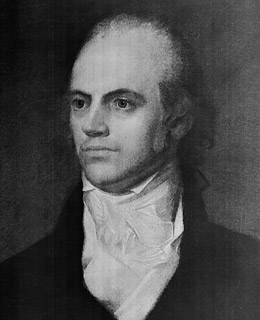
The nation’s third vice president had his strengths: he has been hailed as “one of the best presiding officers the Senate has ever seen.” Unfortunately, his political gifts were dwarfed by his role in two of the biggest scandals ever to strike the office. In an 1804 duel in Weehawken, N.J., Burr shot and killed former Treasury Secretary Alexander Hamilton, a Founding Father and Federalist Papers author held in sufficiently high regard that his image graces the $10 bill. That episode torpedoed Burr’s career — he was indicted for murder and fled to the South — but the former lawyer wasn’t done making mischief. In 1807, he was charged with treason for allegedly masterminding a plot to attack the Spanish colony of Mexico; some claimed he also planned to liberate the Union’s Western states in order to form his own empire. At his trial, Burr subpoenaed President Thomas Jefferson, who — in an early example of executive privilege — refused to testify. Burr was later acquitted.
—Alex Altman
Elbridge Gerry
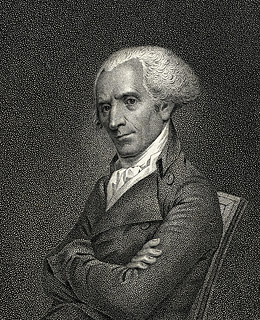
A veritable Zelig of early American history, Elbridge Gerry signed the Declaration of Independence, hobnobbed with the likes of John Adams and John Hancock and served as a delegate to the Constitutional Convention (where he refused to sign the Constitution because he did not like the way it was written). As governor of Massachusetts, he had the unfortunate honor of inspiring the term “gerrymandering,” after redrawing congressional districts to his own advantage. Sadly, when it came to being the Republican party’s vice-presidential candidate, Gerry didn’t rate higher than third string: DeWitt Clinton and John Langdon, its first and second choices, declined the position. The party offered it to Gerry, who accepted. He might have been better off refusing: after serving 20 insignificant months under James Madison, he suffered a hemorrhage of the lungs while riding in a carriage and died.
— Claire Suddath
John C. Calhoun
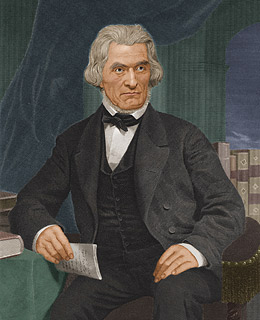
Though he initially aspired to the nation’s highest office, John Calhoun quickly learned to settle for — and even strive to be — number two. He was so intent on the Vice Presidency that before the election of 1824 he offered his support to both John Quincy Adams and Andrew Jackson, who were running against each other. When Adams won, Calhoun filled the office proudly, despite the fact that he was adamantly pro-slavery while Adams was a Northern abolitionist. In fact, he later became known as the “Arch Nullifier” for his ill-conceived proposal to allow any one state to nullify an Act of Congress — effectively an effort to protect slavery in the South. (It was rejected by Northerners and Southerners alike.) When Jackson won the following election, Calhoun continued to serve as Vice President. But he seemed to forget the cardinal rule of the second-most-powerful job in the land — keep your boss happy — and his relationship with Jackson hit the rocks over Calhoun’s decision to ostracize a Washington woman accused of adultery. The social boycott so irked Jackson — a fierce defender of the lady in question — that he fired his entire cabinet and booted Calhoun as well.
—By Tiffany Sharples
Richard M. Johnson
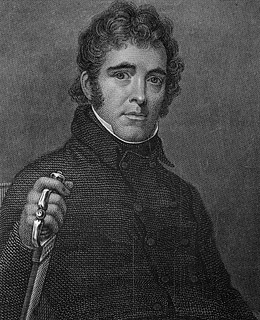
Johnson captured the nation’s attention after he killed Shawnee chief Tecumseh during the Battle of Thames in 1813 (he later campaigned for vice president on this achievement with the campaign slogan “Rumpsey Dumpsey, Colonel Johnson Killed Tecumseh”). The country’s adoration did not last. Later dubbed “the most vulgar man of all vulgar men” by a Senate aide, Johnson scandalized his colleagues by taking one of his slaves as his common-law wife; as a result, he barely garnered enough support to serve in Martin van Buren’s administration. While in office, he proposed an expedition to the North Pole so Americans could drill to the center of the Earth, believing the planet was hollow (his resolution was defeated). Evidently van Buren’s experience with Johnson soured him on vice presidents altogether — when he ran for re-election he dropped Johnson from his ticket and didn’t bother replacing him. Instead, he ran alone.
— M.J. Stephey
William Rufus King
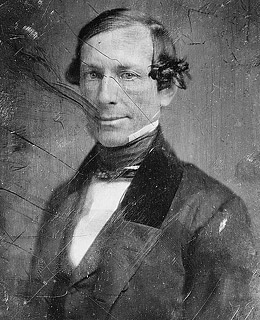
King’s inclusion on this list stems not from scandal or blatant incompetence, but from the fact that the poor guy was only vice president for six weeks before he died of tuberculosis. A foppish dresser who wore powdered wigs long after they were fashionable, King carved out a distinguished career in the Senate, where he represented Alabama following its admission to the Union in 1819. The nation’s only bachelor vice president, King lived with James Buchanan, the nation’s only bachelor president, for more than a decade (they were nicknamed the “Siamese Twins.”) Elected vice president in 1852, King departed for Cuba the following year in the hopes that the climate might ease his rapidly deteriorating health. Sworn into office on March 24, 1853 near Havana — he remains the only vice president to assume office outside the United States — King returned to his Alabama plantation on April 17 and died the next day. The office remained vacant until 1857.
— Gilbert Cruz
John Breckinridge
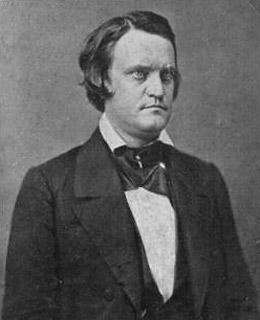
Voted into office as James Buchanan’s Vice President at the tender age of 36, John Cabell Breckinridge is still the youngest person ever to hold the office. And before he became the only one ever forced to flee the country to escape charges of treason, Breckinridge was actually a pretty popular VP: so impressed was Kentucky’s legislature that they elected him to the U.S. Senate a year and a half before his vice presidential term ended.
After a failed bid for the Presidency in the tumultuous 1860 elections (eventually won by Abraham Lincoln), Breckinridge returned to Kentucky, urging the state to secede at the outbreak of the Civil War. But Kentucky stayed in the Union, prompting Breckinridge to quit the Senate and sign up for the Confederate Army. Because his state hadn’t joined the Confederacy, however, his new brothers-in-arms viewed the former Senator with suspicion and immediately charged him with treason. Towards the end of the war, he managed to flee to Florida, where he borrowed a small boat. Breckinridge’s ill luck held: the boat was attacked by pirates, and when he managed to escape in a dinghy, a storm blew away the mast, leaving him bobbing along in the Caribbean for three weeks, eventually washing up in Cuba. (As the story goes, a Cuban band played The Star Spangled Banner and Yankee Doodle at his welcoming ceremony — song choices Breckinridge did not appreciate.) He eventually escaped to Europe, from whence he refused to return until President Andrew Johnson granted him amnesty in 1868. But it wasn’t until a century later that a federal judge in Kentucky officially dismissed the treason charges against him. The town of Breckenridge, Colorado is named in his honor — although it altered the spelling of its name after the Civil War, so as not to be associated with a traitor.
—Claire Suddath
Hannibal Hamlin
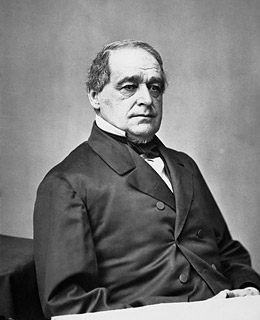
A notorious do-nothing politician, Hamlin preferred to use his office to grant favors and have fun on the government’s dime. The Republican Party picked him to be Abraham Lincoln’s running mate mostly for geographical reasons; they needed an East Coast politician to balance Lincoln’s Midwest roots, and Hamlin’s non-existent legislative record as a House representative, a U.S. Senator and Maine’s Governor made him a safe choice. (The man had a short attention span; he served as governor for two months before deciding he preferred the Senate). Before his nomination, Hamlin had never met Lincoln. During his term the Civil War raged across the country — although Hamlin must have barely noticed; he spent most of his time with his family in Maine. Finally, in 1864, he joined the war effort, serving for three months as a cook in the Coast Guard before quitting. Later, Hamlin would complain to his wife that he was “the most unimportant man in Washington, ignored by the President, the cabinet, and Congress.” Lincoln must have agreed; he dropped Hamlin from his ticket when he ran for a second term, replacing him with Tennessee Senator Andrew Johnson. On April 15, 1865, the morning after Lincoln’s assassination, Johnson was sworn in as commander-in-chief. Nevertheless, Hamlin could not be completely dislodged from public office. He remained in politics, cavorting around Europe with his wife as a diplomat to Spain, until the age of 75.
— M.J. Stephey
Thomas A. Hendricks
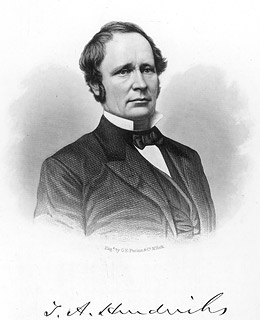
Nineteenth-century vice presidents had an annoying habit of dying in office. The VP spot was vacant for close to a quarter of the 1800’s, partly due to presidential succession rules that were tweaked following the death of Hendricks, who was second in command for almost nine months. A congressman, Senator, and Indiana governor, Hendricks was a staunch opponent of African-American rights — he voted in favor of segregation and against the constitutional amendments that abolished slavery and granted suffrage to former slaves. When Hendricks died in office, on Nov. 25, 1885, both the Speaker of the House and Senate president positions were then vacant, leaving no one to replace him. The following year, Congress passed a law placing cabinet members in the line of succession.
— Gilbert Cruz
Thomas Marshall
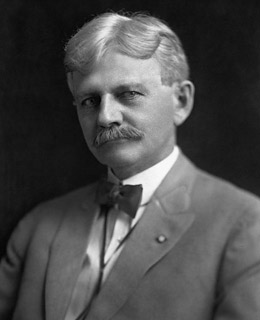
Thomas Marshall was not impressed by the Vice Presidency. During his inaugural speech, he promised to “acknowledge the insignificant influence of the office” and accept his second-class role “in a good-natured way.” As President Woodrow Wilson’s number two, he frequently complained about his “nameless, unremembered” duties and once told a bodyguard that his job was pointless because no one ever shoots a Vice President. The fact that Wilson disliked him personally probably didn’t improve his attitude either.
Marshall and Wilson’s relationship was one of functioning animosity — the Felix Unger and Oscar Madison of Presidential politics. While Wilson was stoic and businesslike, Marshall was full of handshakes and one-liners. He once gifted the President with a book inscribed, “From your only vice.”
Marshall’s lack of enthusiasm showed in his job. He stopped going to cabinet meetings after his first session, and he asked to switch offices to some place where he could put up his feet and smoke. And yet, Wilson kept him on as Vice President during his second term, asking Marshall to head the cabinet while he traveled to Europe at the end of World War I to lobby for the League of Nations. (Marshall accepted, but warned Wilson that he wouldn’t be responsible for anything that happened while he was away.)
After Wilson was incapacitated by a stroke in October 1919, Marshall refused to take his place, worrying that if Wilson recovered and demanded the Presidency back, the country could erupt into a civil war. And of course, he wasn’t very enthusiastic about the job. When Calvin Coolidge was elected as the next Vice President, he received a note from Marshall that read, “Please accept my sincere sympathies.”
—By Claire Suddath
Calvin Coolidge
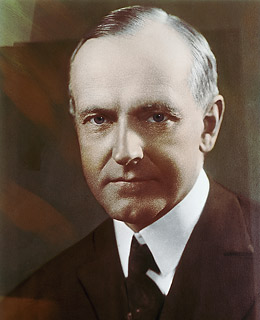
When Calvin Coolidge learned he was nominated to be Warren Harding’s Vice Presidential candidate, his wife asked if he would accept. His even response: “I suppose I’ll have to.” Quiet to the verge of sullen, Coolidge was a perfect foil to Harding, a garrulous playboy of a president. He accomplished little during his Vice Presidency, though he did thoroughly enjoy his role overseeing the Senate, betraying a penchant for process and order by declaring the sessions “entertaining”. When Harding fell ill and died in the summer of 1923, Coolidge was sworn into office by lamplight just before 3 a.m. on August 3 while visiting his family’s home in Vermont. True to form, he later spoke — noncommittally — of his reaction to the prospect of becoming President. “I thought I could swing it,” he said.
—By Tiffany Sharples
Henry Wallace
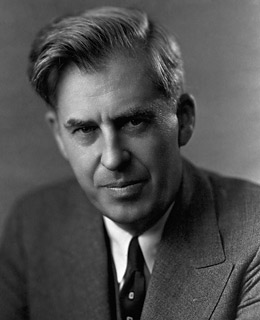
A colleague once described Henry Wallace as “a person answering calls the rest of us don’t hear.” Wallace did indeed feel a calling: the Iowa-born son of a former agriculture secretary declared his greatest aspiration was “to make the world safe for corn breeders.” Despite his unconventional pedigree and the rest of his party’s fervent opposition to his selection, Wallace was shoehorned into office by F.D.R., who made his running mate an economic policy czar and a key foreign emissary. Though he was a ardent believer in mankind’s inherent goodness, Wallace couldn’t elicit goodwill from his colleagues, many of whom found his mystical approach toward religion — he dabbled in ideologies ranging from Catholicism to Zoroastrianism — a bit unsettling.
In 1944, the Democrats bypassed Wallace to select Harry S. Truman as their vice-presidential nominee. Wallace was named Secretary of Commerce, where he feuded bitterly with Truman — who had by then ascended to the Oval Office — over the nation’s confrontational posturing with the Soviet Union, which the agricultural expert deemed dangerously hawkish. The clash earned Wallace a reputation among his detractors as a “Stalinist stooge.” Alienated but undeterred, he mounted a run for the presidency in 1947. One writer later termed his candidacy “the closest the Soviet Union ever came to actually choosing a president of the United States.” Not that Wallace posed much of a threat: he garnered zero electoral votes. Chagrined, he retired from politics and spent many of his remaining days tinkering with egg and corn yields on his New York farm.
— By Alex Altman
Richard M. Nixon
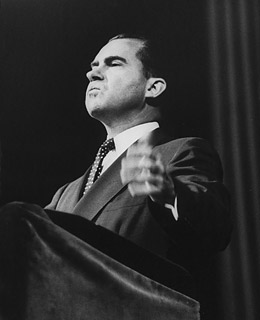
Correction appended Aug. 28, 2008
During the 1952 campaign, Nixon jeopardized the presidential candidacy of Dwight Eisenhower by promptly embroiling himself in scandal. “Tricky Dick,” as a newspaper dubbed the Vice Presidential candidate, was accused of maintaining an illegal slush fund stocked by wealthy businessmen. In a televised address, later known as the “Checkers” speech, he decried the allegations — his wife didn’t even have a mink coat, he pointed out — and said the only gift he’d ever taken was an adorable spotted dog named Checkers. “The kids, like all kids, love the dog,” he growled, “and I just want to say this right now, that regardless of what they say about it, we’re gonna keep it.” Nixon stayed on the ticket, and he and Eisenhower went on to win the election. Nixon rode out two terms as Vice President with minimal impact, with the exception of two infamous trips abroad: During a tour of Latin America, people spat on his cavalcade, and in 1959 he engaged in the controversial and heated “kitchen debate” in Moscow with Soviet leader Nikita Khrushchev. Other than those standouts, he filled his office inconsequentially. As Eisenhower himself put it when asked about Nixon’s contributions, “If you give me a week, I might think of one.”
—By Tiffany Sharples
The original version of this story described the “kitchen debate” as “foul-mouthed.” While Nixon and Khrushchev’s conversation in the Kremlin during his visit to Moscow were, according to William Taubman, marked by expletives, the audiotape of the “kitchen debate” exchange that followed — and was preserved on video — contains no obscenities, according to historian William Taubman.
Spiro Agnew
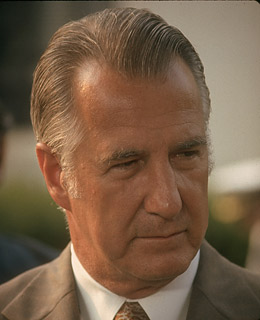
He blasted critics of Nixon’s presidency and the Vietnam War with fierce alliteration — “supercilious sophisticates,” “vicars or vacillation,” “pusillanimous pussyfooters”— and was known to peg spectators with ill-directed golf shots, but it was Agnew’s behavior before he took national office that ultimately led to his downfall. As Watergate unfolded, Nixon — wanting to deflect negative attention away from himself — forced Agnew to publicly announce in 1973 that the Justice Department was investigating bribery accusations dating from Agnew’s tenure as governor of Maryland. Agnew declared that had “nothing to hide,” but weeks later he was indicted and pleaded no contest to the felony charge. He was fined $10,000 and sentenced to probation. Agnew’s fall did little to help his former boss, who resigned a year later. In a 1980 book, Agnew claimed he had been innocent but resigned under pressure from Nixon.
—Kate Pickert
Dan Quayle
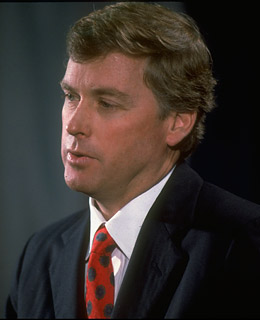
Bush’s choice of 41-year-old Indiana Senator J. Danforth Quayle as his running mate shocked the political establishment, which had expected the longtime diplomat to pick someone more seasoned. Quayle didn’t help his case by refusing to release his academic records. He had plenty to be modest about: he had failed an undergraduate comprehensive exam at DePauw University; one of his former professors referred to him as “vapid”; and he was admitted to law school at the University of Indiana under an “equal opportunity” program for poor and minority students. Quayle earned one of the worst beatdowns in televised political history by comparing himself to John F. Kennedy in the 1988 Vice Presidential debate, prompting a scathingly dismissive “You’re no Jack Kennedy” from opponent Lloyd Bentsen. In office, his constant verbal gaffes made him a political laughingstock. “We don’t want to go back to tomorrow, we want to go forward.” “I stand by all my misstatements.” “Bobby Knight told me this, ‘There is nothing that a good defense cannot beat a better offense.’ In other words, a good offense wins.” But it was the dreaded “potatoe” incident that did Quayle in. While visiting a school in Trenton, NJ, a student was asked to write the word ‘potato’ on the blackboard and Quayle urged him to add an ‘e’ to the end. The entire nation held its belly in laughter.
—Kate Pickert
Richard B. Cheney
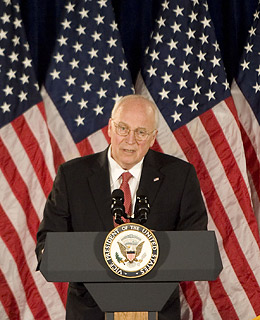
Having served as a Congressman, White House Chief of Staff, Secretary of Defense and the CEO of oil and gas giant Halliburton, Cheney came to the White House with among the most formidable resumes of any vice president. Harnessing his intimate knowledge of the Capitol’s back alleys, Cheney emerged as the bare-knuckled architect — or, in the eyes of some, the shadowy puppetmaster — behind many of the administration’s most controversial policies. Cheney led the charge in calling for the invasion of Iraq, based on the misleading claim that Saddam Hussein possessed weapons of mass destruction; curtailed domestic civil liberties; and pressed to limit restrictions on the treatment of enemy combatants. Critics alleged he played a role in the 2003 leak that outed then CIA operative Valerie Plame; his former chief of staff, I. Lewis “Scooter” Libby, was convicted of perjury and obstruction of justice for making false statements during the investigation of the incident. The bellicose veep also swore at a colleague during a Senate class photo and, adding injury to insult, delighted his detractors by accidentally shooting a hunting partner in the face.
—Alex Altman
More Must-Reads from TIME
- Inside Elon Musk’s War on Washington
- Meet the 2025 Women of the Year
- The Harsh Truth About Disability Inclusion
- Why Do More Young Adults Have Cancer?
- Colman Domingo Leads With Radical Love
- How to Get Better at Doing Things Alone
- Cecily Strong on Goober the Clown
- Column: The Rise of America’s Broligarchy
Contact us at letters@time.com